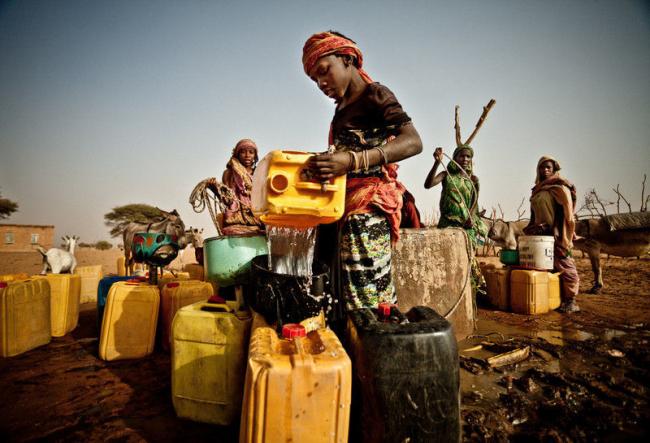By Joanna Allan
21st November

A woman draws water from a well in the community of Natriguel, Mauritania
0 comment
WAR has returned to Western Sahara after a 29-year ceasefire.
The conflict was sparked when the Moroccan army entered Guerguerat, a “buffer zone” just south of the Moroccan-occupied Western Sahara, to divert Saharawi peaceful protesters blocking Morocco’s “plunder corridor” to Mauritania. According to the ceasefire agreement, no military personnel are permitted to enter the buffer zone.
“Polisario Front have withdrawn from the ceasefire agreement in response to the Moroccan army’s military aggression against Saharawi civilians who were legally and peacefully protesting against the Guerguerat illegal breach and the continuous plundering of their natural resources,” said Sidi Breika, Western Saharan Polisario Front representative to the UK.
Polisario has evacuated the protesters and is now targeting Moroccan military positions.
Western Sahara was a Spanish colony until 1975. Instead of de-colonising, Spain sold “Spanish Sahara” to neighbouring Morocco in return for continued rights over the country’s fisheries and a share of profits from the phosphates mine. As Moroccan troops invaded, indigenous Saharawi civilians fled to refugee camps in neighbouring Algeria, where the Saharawi liberation movement, the Polisario Front, set up a state-in-exile. A total of 180,000 Saharawi refugees remain there to this day, living on food aid.
Saharawis that could not flee in 1975 have spent the last 45 years under Moroccan occupation, widely considered by human rights NGOs as among the worst places in the world in terms of political freedom.
Polisario and Morocco were at war until 1991 when the UN brokered a ceasefire promising a referendum on independence for the Saharawis but this has been blocked continuously by Morocco.
Meanwhile, in contravention of the Geneva Convention, Morocco moved hundreds of thousands of settlers into Western Sahara and exploited the country’s natural resources. British companies also have interests in this troubled country.
Presidents of Saharawi voluntary organisations who have protested against the situation are serving life sentences in Moroccan prisons in retribution.
Moroccan authorities have now cracked down on Saharawi pro-independence and human rights activists.
Joanna Allan is Leverhulme Fellow at Northumbria University
No comments:
Post a Comment